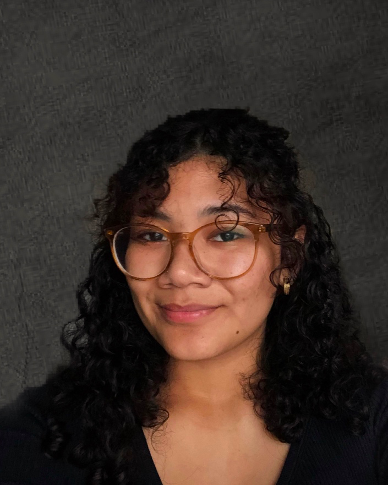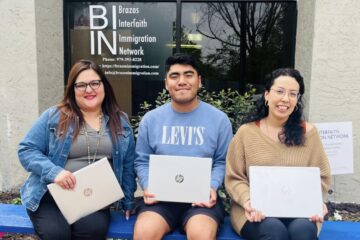CMSA and ComUnidad 2021
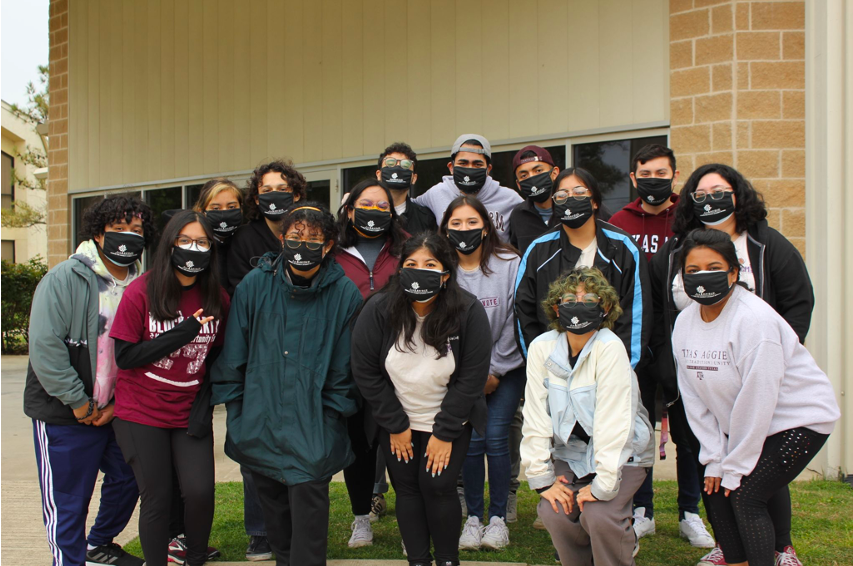
BIIN benefits in countless ways from operating in a community that Texas A&M University also calls home. From the wide and diverse realm of TAMU-related people, BIIN regularly recruits much of the human capital needed to run a small non-profit: volunteers of all sorts, including program leaders and board members; unpaid interns and part-time staff; loyal sustaining donors and long-time volunteers as well as people who give or help out occasionally. BIIN has also received grants from units associated with TAMU, such as the Mays School of Business, and the organization benefits in other ways from the diversity of people and resources that a major university brings to the region.
There is, however, another link between BIIN and TAMU that is less well known, but just as worthy of recognition. To understand this link, you may first need to learn some more lingo: CMSA and ComUnidad.
Every year, a trio of students from the Council of Minority Student Affairs (CMSA) at TAMU serve as “student liaisons” on the BIIN Board of Directors. In this capacity, the three CMSA representatives attend monthly meetings of the board and use what they learn to facilitate ways for TAMU students to connect with and serve underserved communities in the Brazos Valley. In 2020-21, the three CMSA External Affairs Officers who have served as student liaisons to BIIN are Sofia Chunga Pizarro, Edson Damian-Jacobo, and Maria Gamboa Campos.
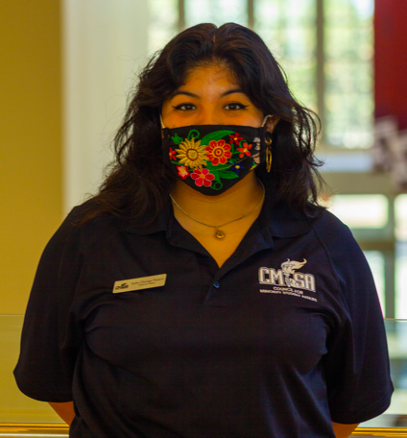
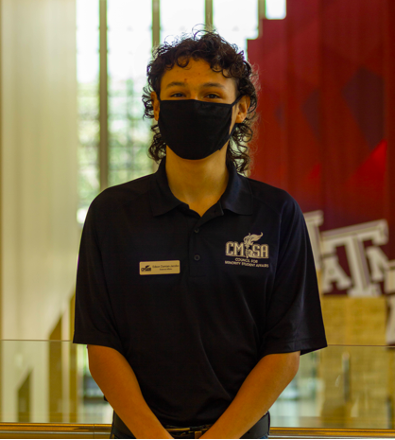
CMSA External Affairs Officers Sofia Chunga Pizarro and Edson Damian-Jacobo
The Council for Minority Student Affairs is a student-led organization at Texas A&M University that aims to create awareness, provide resources, and take action to empower the immigrant and other underrepresented communities on and off campus. Through education, safe space, and activism, we encourage our members to recognize the value of their stories and identities, as well as the role that they take within the community.
In previous years, ComUnidad has consisted of going out into the community and helping with things like yard work, light painting jobs, and other tasks for residents and some local non-profit organizations. This event was started in an effort to bridge the gap between the Bryan community and Texas A&M students by introducing aid in a familiar language and culture.
We decided to change this year’s version of ComUnidad after March 2nd, the day Gov. Abbott decided to lift the mask mandate. Our board agreed that it would not be responsible to go in offering these services if it meant possibly increasing the risk of COVID-19 to the community. Due to the physical nature of the original ComUnidad’s activities, it would have likely caused more harm than good. I pitched the idea of having some sort of food distribution, thinking that it was better suited to current conditions as it would involve the least amount of physical contact between volunteers and the community.
With the help of our members and the rest of the executive board, we were able to work out logistics. Sofia, one of the other External Affairs officers, was able to secure grants from the Cantu Fund and the Maroon Coats Fund. The event was fully funded by those two grants, which we used to purchase the boxes, food, masks, and pamphlets about other resources that we distributed, as well as PPE for our volunteers.
We know that there are many different food banks and pantries that provide food free of cost to low-income families. While anyone can apply to get these benefits, there is often some paperwork involved, such as providing a photo ID and proof of residence. This can sometimes steer people away from making use of these resources so we wanted to provide them with a direct alternative. Regardless of the type of activity we do for ComUnidad, the essence of the event remains the same. We want to give back to the community that so generously hosts some of us during our time at A&M. We aim to be of service and provide resources as best we can.
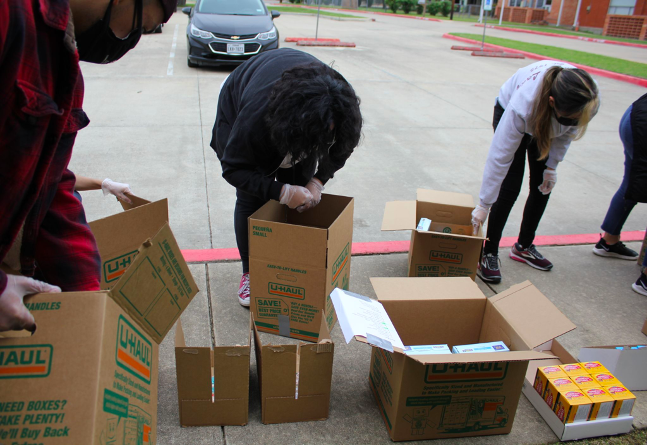
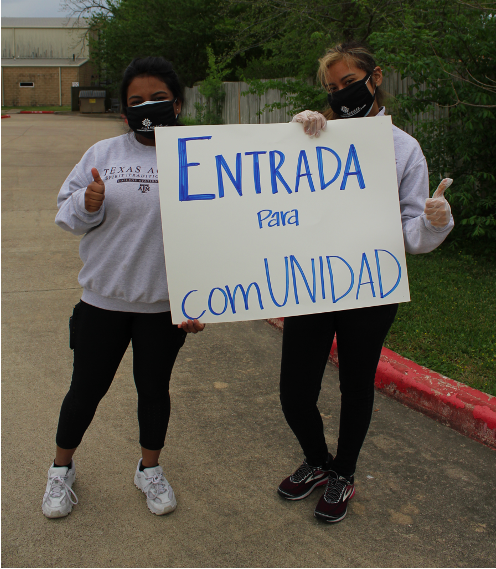
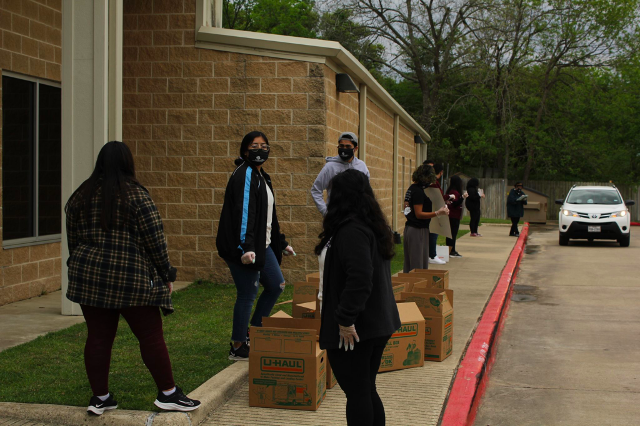
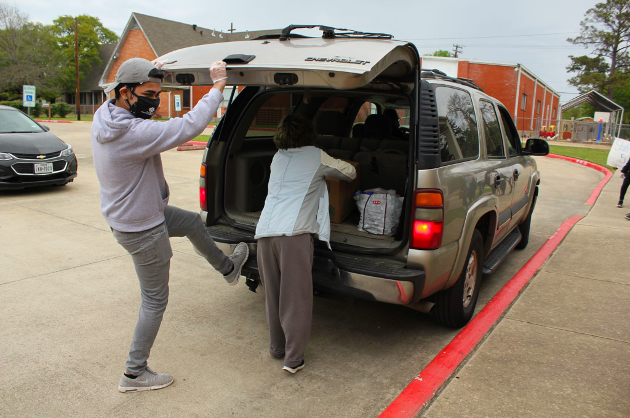
Were you able to talk with any of the families served? What did this assistance mean to them?
I was able to talk to a couple of families during the event and on the phone during registration. There was a particular woman who told us how the food box would alleviate at least a week’s worth of grocery store trips and expenses. This interaction alone really made us realize that ComUnidad was more than just giving out boxes of food. We received a lot of questions about when this event would occur again. The demand certainly exists so now we want to focus on expanding our reach. Regardless of whether it was of substantial or trivial value for each family’s pantry, we want to keep doing events like these.
In the future, we’d love to be able to increase the number of families served. We are currently trying to make this event something that occurs at least twice a year. In order to do that, we would like to secure additional grants and sponsorships to be able to give the community resources they deserve. Furthermore, we would love for CMSA to develop new partnerships with local organizations to provide resources tailored to the community. With more planning time, we want to involve BIIN more in the event itself.
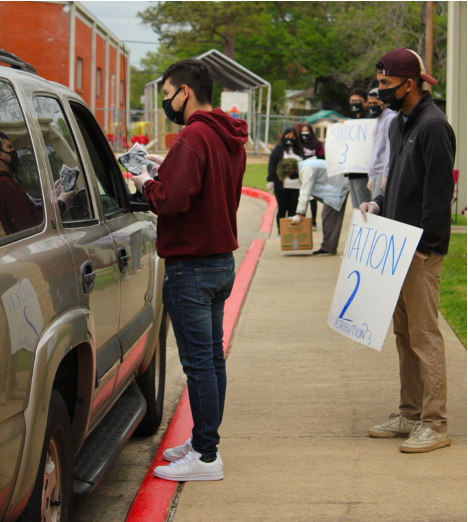
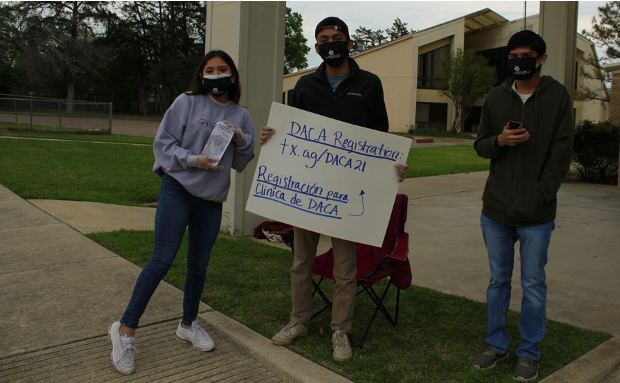
Plans for future DACA workshops are already in the works. If conditions allow, we want this workshop to be more accessible by renting out a space for people to come in person. We recognize that hosting a DACA workshop online may come with a few drawbacks. The lack of technology access, technology literacy, and sensitivity about legal documents can make people wary of participating. Even though given the circumstances, it was a pretty successful workshop, we want to eliminate these barriers as much as possible in the future.
CMSA and BIIN have very similar missions and visions. Being part of the board for both organizations, we were able to see the overlap firsthand. I think I can speak for all three of us when I say that this was our first time participating in a non-profit organization as part of the board of directors. It has been instructive to see what goes behind the scenes of an organization that is so important to the Bryan-College Station community. Participating on the board has allowed us to better understand the importance of community-centered non-profits. We’ve learned that everyone has a different but important role to play in the community. Overall, it has been a unique experience and we appreciate the chance to participate in such an informative and kind environment.
At CMSA, we truly value the relationship we have with BIIN. As student liaisons, we try to relay all the important messages and projects from the CMSA Board to the BIIN Board and vice versa. For more direct interaction between CMSA members and BIIN board meetings, we could invite members to tell us about any ideas they might have to improve community engagement and outreach.
I think our members could add valuable input and fresh perspectives. We also strongly encourage them to volunteer their time and skills to programs such as the Citizenship and Conversation Partner programs. Our goal for the upcoming semester is to strengthen and deepen our relationship with BIIN through more member engagement.
